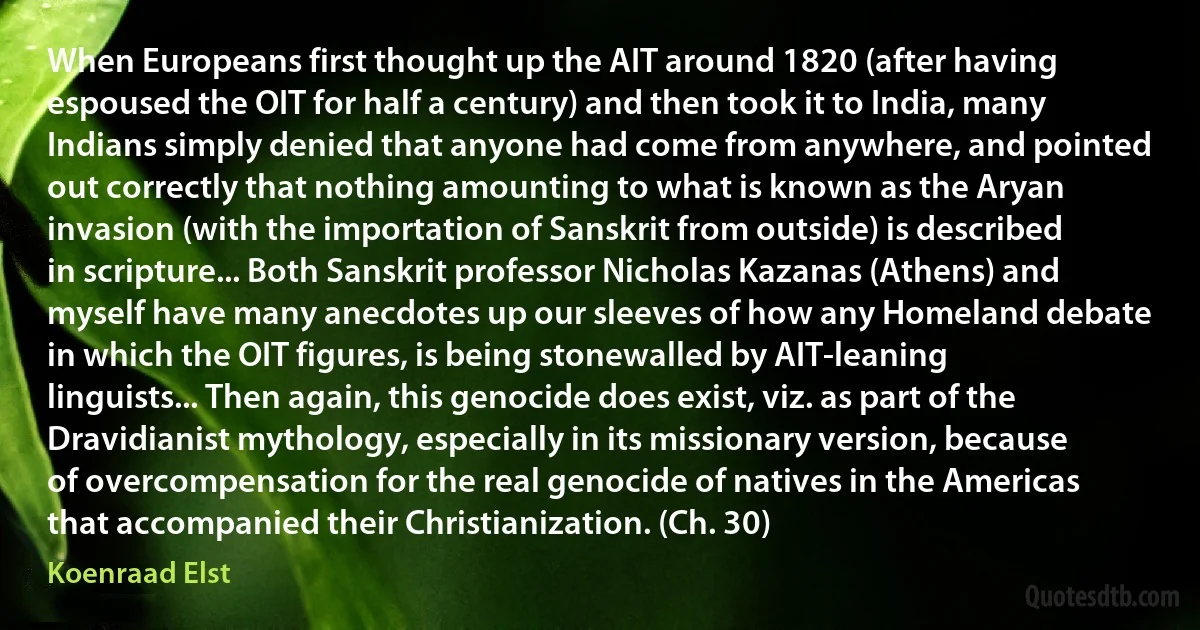
When Europeans first thought up the AIT around 1820 (after having espoused the OIT for half a century) and then took it to India, many Indians simply denied that anyone had come from anywhere, and pointed out correctly that nothing amounting to what is known as the Aryan invasion (with the importation of Sanskrit from outside) is described in scripture... Both Sanskrit professor Nicholas Kazanas (Athens) and myself have many anecdotes up our sleeves of how any Homeland debate in which the OIT figures, is being stonewalled by AIT-leaning linguists... Then again, this genocide does exist, viz. as part of the Dravidianist mythology, especially in its missionary version, because of overcompensation for the real genocide of natives in the Americas that accompanied their Christianization. (Ch. 30)
Koenraad ElstRelated topics
ait anyone aryan century debate half having importation known missionary mythology nothing outside real take thought version viz genocide NicholasRelated quotes
Social equality does not necessarily follow from civil equality, and yet for the purpose of a hell black and damning prejudice, our papers still insist that the Civil Rights Bill is a Bill to establish social equality. If it is a Bill for social equality, so is the Declaration of Independence, which declares that all men have equal rights; so is the Sermon on the Mount, so is the Golden Rule, that commands us to do to others as we would that others should do to us; so is the Apostolic teaching, that of one blood God has made all nations to dwell on all the face of the earth; so is the Constitution of the United States, and so are the laws and customs of every civilized country in the world; for nowhere, outside of the United States is any man denied civil rights on account of his color.

Frederick Douglass
Robert Caserio recently said to me, "The whole profession has become a vast mimicry. The idea that there is open debate is an absolute fiction. There is only the Foucault monologue, the Lacan monologue, the Derrida monologue. There is no room for creative disagreement. No deviation from what is approved is tolerated.” These monologues are really one, the monotonous drone of the School of Saussure, which has cast its delusional inky cloud over modern academic thought. Never have so many been wrong about so much. It is positively idiotic to imagine that there is no experience outside of language. ... It has been a truism of basic science courses for decades in America that the brain has multiple areas of function and that language belongs only to specific areas, injured by trauma and restored by surgery or speech therapy.

Camille Paglia
Let us not despair; it is a blessed cause, and success, ere long, will crown our exertions. Already we have gained one victory; we have obtained, for these poor creatures, the recognition of their human nature, which, for a while was most shamefully denied. This is the first fruits of our efforts; let us persevere and our triumph will be complete. Never, never will we desist till we have wiped away this scandal from the Christian name, released ourselves from the load of guilt, under which we at present labour, and extinguished every trace of this bloody traffic, of which our posterity, looking back to the history of these enlightened times, will scarce believe that it has been suffered to exist so long a disgrace and dishonour to this country.

William Wilberforce
It is one of the most beautiful characteristics of Theosophy that it gives back to people in a more rational form everything which was really useful and helpful to them in the religions which they have outgrown... in this teaching as to the immortality of the soul and the life after death, Theosophy...does not put forward these great truths merely on the authority of some sacred book of long ago; in speaking of these subjects it is not dealing with pious opinions, or metaphysical speculations, but with solid, definite facts, as real and as close to us as the air we breathe or the houses we live in - facts of which many among us have constant experience - facts among which lies the daily work of some of our students, as will presently be seen.

Charles Webster Leadbeater
Don't forget that God sees you and watches you when you are in pain; He perceives even the beating of your heart. Consequently, He will not leave you without consolation and His fatherly protection. Naturally, the saints rejoiced in their afflictions; as for us, let us at least manage to accept affliction or pain patiently.
My child, pray within your heart, and the name of Jesus will become for you a comforting balm so that you can bear this trial of yours in a way which benefits you. You will greatly benefit from this trial if you submit yourself to it patiently. So again I say to you, with the almighty armor of prayer continually approach the omnipotent Lord more often, and you will come to know how He wondrously lifts the burden of pain and marvellously gives rest to sufferers.

Ephraim of Arizona
